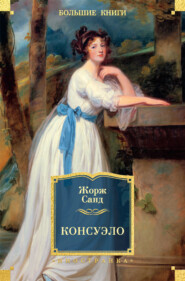По всем вопросам обращайтесь на: info@litportal.ru
(©) 2003-2025.
✖
The George Sand-Gustave Flaubert Letters
Настройки чтения
Размер шрифта
Высота строк
Поля
"Not put one's heart into what one writes?" I don't understand at all, oh! not at all! As for me, I think that one can not put anything else into it. Can one separate one's mind from one's heart? Is it something different? Can sensation itself limit itself? Can existence divide itself? In short, not to give oneself entirely to one's work, seems to me as impossible as to weep with something else than one's eyes, and to think with something else than one's brain.
What was it you meant? You must tell me when you have the time.
XXXIX. TO GUSTAVE FLAUBERT
Paris, 8 December, 1866
You ask me what I am doing? Your old troubadour is content this evening. He has passed the night in re-doing a second act which did not go properly and which has turned out well, so well that my directors are delighted, and I have good hopes of making the end effective – it does not please me yet, but one must pull it through. In short, I have nothing to tell you about myself which is very interesting. When one has the patience of an ox and the wrist broken from crushing stones well or badly, one has scarcely any unexpected events or emotions to recount. My poor Manceau called me the ROAD- MENDER, and there is nothing less poetic than those beings.
And you, dear friend, are you experiencing the anguish and labors of childbirth? That is splendid and youthful. Those who want them don't always get them!
When my daughter-in-law brings into the world dear little children, I abandon myself to such labor in holding her in my arms that it reacts on me, and when the infant arrives, I am sicker than she is, and even seriously so. I think that your pains now react on me, and I have a headache on account of them. But alas! I cannot assist at any birth and I almost regret the time when one believed it hastened deliverances to burn candles before an image.
I see that that rascal Bouilhet has betrayed me; he promised me to copy the Marengo letter in a feigned hand to see if you would be taken in by it. People have written to me seriously things like that. How good and kind your great friend is. He is adored at the Odeon, and this evening they told me that his play was going better and better. I went to hear it again two or three days ago and I was even more delighted with it than the first time.
Well, well, let's keep up our heart, whatever happens, and when you go to rest remember that someone loves you. Affectionate regards to your mother, brother and niece.
G. Sand
XL. TO GEORGE SAND
Croisset, Saturday night
I have seen Citizen Bouilhet, who had a real ovation in his own country. His compatriots who had absolutely ignored him up to then, from the moment that Paris applauded him, screamed with enthusiasm. – He will return here Saturday next, for a banquet that they are giving him, – 80 covers, at least.
As for Marengo the Swallow, he kept your secret so well, that he read the letter in question with an astonishment which duped me.
Poor Marengo! she is a figure! and one that you ought to put in a book. I wonder what her memoirs would be, written in that style? – Mine (my style) continues to give me no small annoyance. I hope, however, in a month, to have crossed the most barren tract. But at the moment I am lost in a desert; well, by the grace of God, so much the worse for me! How gladly I shall abandon this sort of thing, never to return to it to my dying day! Depicting the modern French bourgeois is a stench in my nostrils! And then won't it be time perhaps to enjoy oneself a bit in life, and to choose subjects pleasant to the author?
I expressed myself badly when I said to you that "one should not write from the heart." I meant to say: not put one's personality into the picture. I think that great art is scientific and impersonal. One should, by an effort of mind, put oneself into one's characters and not create them after oneself. That is the method at least; a method which amounts to this: try to have a great deal of talent and even of genius if you can. How vain are all the poetic theories and criticisms! – and the nerve of the gentlemen who compose them sickens me. Oh! nothing restrains them, those boneheads!
Have you noticed that there is sometimes in the air a current of common ideas? For instance, I have just read my friend Du Camp's new novel: Forces Perdues. It is very like what I am doing, in many ways. His book is very naive and gives an accurate idea of the men of our generation having become real fossils to the young men of today. The reaction of '48 opened a deep chasm between the two Frances.
Bouilhet told me that you had been seriously ill at one of the recent Magny's, although you do pretend to be a "woman of wood." Oh! no you are not of wood, dear good great heart! "Beloved old troubadour," would it not perhaps be opportune to rehabilitate him at the Theatre Almanzor? I can see him with his toque and his guitar and his apricot tunic howling at the black-gowned students from the top of a rock. The talk would be fine. Now, good night; I kiss you on both cheeks tenderly.
XLI. TO GUSTAVE FLAUBERT
Paris, 7 December, 1866
Something like a week ago someone came to my house in the morning to ask me the address of the bootmaker, my maid did not want to awaken me, and it was not until noon that I read the letter; the bearer said he came from the Hotel Helder on the rue Helder. I answered at once that Simonin lived at 15 rue Richelieu, I wrote to your mother thinking that it was she who wrote to me. I see that she did not receive my note and I don't understand about it, but it is not my fault.
Your old Troubadour is sick as a dog again today, but it will not prevent him from going to Magny's this evening. He could not die in better company; although he would prefer the edge of a ditch in the spring.
Everything else goes well and I leave for Nohant on Saturday. I am trying hard to push the entomological work which Maurice is publishing. It is very fine.
I am doing for him what I have never done for myself. I am writing to the newspaper men.
I shall recommend Mademoiselle Bosquet to whom I can, but that appeals to another public, and I don't stand in as well with the literary men as I do with the scholars. But certainly Marengo the Swallow MUST BE DONE and the apricot troubadour also. All that was of the Cadios of the revolution who began to be or who wanted to be something, no matter what. I am of the last comers and you others born of us, you are between the illusions of my time and the crude deception of the new times. It is quite natural that Du Camp should go parallel with you in a series of observations and ideas, that does not mean anything. There will be no resemblance.
Oh no! I have not found a title for you, it is too serious, and then I should need to know everything. In any case I am no good today to do anything except to draw up my epitaph. Et in Arcadia ego, you know, I love you, dear friend brother, and bless you with all my heart.
G. Sand
Monday.
XLII. TO GUSTAVE FLAUBERT, at Croissset
Paris, 9 January, 1867
Dear comrade,
Your old troubadour has been tempted to bite the dust. He is still in Paris. He should have left the 25th of December; his trunk was strapped; your first letter was awaiting him every day at Nohant. At last he is all ready to leave and he goes tomorrow with his son Alexandre [Footnote: Alexandre Dumas fils.] who is anxious to accompany him.
It is stupid to be laid on one's back and to lose consciousness for three days and to get up as enfeebled as if one had done something painful and useful. It was nothing after all, except temporary impossibility of digesting anything whatever. Cold, or weakness, or work, I don't know. I don't think of it any longer. Sainte-Beuve is much more disquieting, somebody have written you about it. He is better also, but there will be serious trouble, and on account of that, accidents to look out for. I am very saddened and anxious about it.
I have not worked for two weeks; so my task has not progressed very much, and as I don't know if I am going to be in shape very soon, I have given the Odeon A VACATION. They will take me when I am ready. I think of going a little to the south when I have seen my children. The plants of the coast are running through my head. I am prodigiously uninterested in anything which is not my little ideal of peaceful work, country life, and of tender and pure friendship. I really think that I am not going to live a long time, although I am quite cured and well. I get this warning from the great calm, CONTINUALLY CALMER, which exists in my formerly agitated soul. My brain only works from synthesis to analysis, and formerly it was the contrary. Now, what presents itself to my eyes when I awaken is the planet; I have considerable trouble in finding again there the MOI which interested me formerly, and which I begin to' call YOU in the plural. It is charming, the planet, very interesting, very curious but rather backward, and as yet somewhat unpractical; I hope to pass into an oasis with better highways and possible to all. One needs so much money and resources in order to travel here! and the time lost in order to procure. these necessaries is lost to study and to contemplation. It seems to me that there is due me something less complicated, less civilized, more naturally luxurious, and more easily good than this feverish halting-place. Will you come into the land, of my dreams, if I succeed in finding the road? Ah! who can know?
And the novel, is it getting on? Your courage has not declined? Solitude does not weigh on you? I really think that it is not absolute, and that somewhere there is a sweetheart who comes and goes, or who lives near there. But there is something of the anchorite in your life just the same, and if envy your situation. As for me, I am too alone at Palaiseau, with a dead soul; not alone enough at Nohant, with the children whom I love too much to belong to myself, – and at Paris, one does not know what one is, one forgets oneself entirely for a thousand things which are not worth any more than oneself. I embrace you with all my heart, dear friend; remember me to your mother, to your dear family, and write me at Nohant, that will do me good.
The cheeses? I don't know at all, it seems to me that they spoke to me of them, but I don't remember at all. I will tell you that from down there.
XLIII. TO GEORGE SAND
Croisset, Saturday night
No, dear master, you are not near your end. So much the worse for you perhaps. But you will live to be old, very old, as giants live, since you are of that race: only you MUST rest. One thing astonishes me and that is that you have not died twenty times over, having thought so much, written so much and suffered so much. Do go then, since you have the desire, to the Mediterranean. Its azure sky quiets and invigorates. There are the Countries of Youth, such as the Bay of Naples. Do they make one sadder sometimes? I do not know.
Life is not easy! What a complicated and extravagant affair! I know something about that. One must have money for everything! So that with a modest revenue and an unproductive profession one has to make up one's mind to have but little. So I do! The habit is formed, but the days that work does not go well are not amusing. Yes indeed! I would love to follow you into another planet. And a propos of money, it is that which will make our planet uninhabitable in the near future, for it will be impossible to live here, even for the rich, without looking after one's property; one will have to spend several hours a day fussing over one's INCOME. Charming! I continue to fuss over my novel, and I shall go to Paris when I reach the end of my chapter, towards the middle of next month.
And whatever you suspect, no "lovely lady" comes to see me. Lovely ladies have occupied my mind a good deal, but have taken up very little of my time. Applying the term anchorite to me is perhaps a juster comparison than you think.
I pass entire weeks without exchanging a word with a human being, and at the end of the week it is not possible for me to recall a single day nor any event whatsoever. I see my mother and my niece on Sundays, and that is all. My only company consists of a band of rats in the garret, which make an infernal racket above my head, when the water does not roar or the wind blow. The nights are black as ink, and a silence surrounds me comparable to that of the desert. Sensitiveness is increased immeasurably in such a setting. I have palpitations of the heart for nothing.
All that results from our charming profession. That is what it means to torment the soul and the body. But perhaps this torment is our proper lot here below?
I told you, didn't I, that I had reread Consuelo and the Comtesse de Rudolstadt; it took me four days. We must discuss them at length, when you are willing. Why am I in love with Siverain? Perhaps because I am of both sexes.
XLIV. TO GUSTAVE FLAUBERT at Croissset
Nohant, 15 January, 1867
Here I am at home, fairly strong except for several hours during the evening. Yet, THAT WILL PASS. THE EVIL OR HE WHO ENDURES IT, my old cure used to say, CAN NOT LAST. I received your letter this morning, dear friend of my heart. Why do I love you more than most of the others, even more than old and well-tried friends? I am asking, for my condition at this hour, is that of being
THOU WHO GOEST SEEKING, AT SUNSET, FORTUNE! …
Yes, intellectual fortune, LIGHT! Oh well, here it is: one gets, being old, at the sunset of life, – which is the most beautiful hour of tones and reflections, – a new idea of everything and of affection above all.
In the age of power and of personality, one tests one's friends as one tests the earth, from the point of view of reciprocity. One feels oneself solid, one wants to find that which bears one or leads one, solid. But, when one feels the intensity of the moi fleeing, one loves persons and things for what they are in themselves, for what they represent in the eyes of one's soul, and not at all for what they add further to one's destiny. It is like the picture or the statue which one would like to own, when one dreams at the same time of a beautiful house of one's own in which to put it.

















